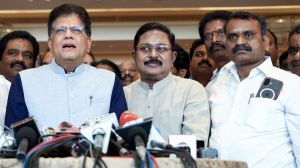Jaswants Jinnah
Jaswant Singh opens up serious and interesting questions,but fails in resolving them
Jaswant Singh opens up serious and interesting questions,but fails in resolving them
Writing about the politics of Partition in the right register seems impossible. Entrenched ideological commitments,the desire for explanations,the need to apportion blame,and a preoccupation with subtexts make the history almost impossible to write. Writing on Partition also suffers from a peculiarly unimaginative take on human agency. How could anyone in the 1930s and 40s have imagined what the Indian subcontinent would be like? How do such a complicated and brilliant cast of political characters engage in complex political negotiations? How easy is it to read intentions? What is the relationship between the negotiations of these characters and the complex movements of self and identity brewing on the ground? How do we think of possible counterfactuals: if only Nehru had done X or Mountbatten had done Y? There has always been a false confidence with which so many historians approach these difficult questions. There is also the wishing away of uncomfortable thoughts. Men acting in good faith can produce unintended consequences; and often two incompatible lines of argument seem to have their own internal integrity. It is easy to argue that Hindus and Muslims were not two nations. It is far more difficult to suggest what framework would have accommodated all possible aspirations. It is far too easy to take a position on should India have been a strong,central state or a weak federation. But it is more difficult to make a knockdown argument for one position or the other. Yet,we write and argue as if all these judgments are so easy. Certainly,none of the characters central to this drama Jawaharlal Nehru,Mahatma Gandhi,Vallabhbhai Patel or Mohammed Ali Jinnah ever thought there were easy answers. Their moments of self doubt,hesitation and frustration are a tribute to their seriousness,as much as our encrusted certainties are a reminder of the laziness of our condescension.
This is the backdrop against which a serious book like Jaswant Singhs Jinnah must be approached. It is a prodigious work of scholarship,wide-ranging in its references and well documented. It has its own historical judgments to make and sometimes they are too swift. But there is no doubt that the book opens up serious and interesting questions. It has a narrative of its own. Partition was not the result of an irrevocable religious cleavage between Hindus and Muslims. It was squarely a product of politics. The Congress was unable to handle its own success,as it were. The issue is not whether the Congress was right in its ideological commitments or not. The issue is whether it had the political capacity and sense of judgment to deal with those who might challenge it. The issue is not which theory of nationhood was right. The real political question is how you handle deep disagreement. In this crucial respect,Singh argues,the Congress spectacularly misjudged Jinnah at many levels: his political tenacity,his tactical adaptability,his single-mindedness,his sense of mission. The roots of these misjudgments are deep. Partly it was overconfidence. After the UP election results,the Congress came to the erroneous conclusion that it did not need to share power with the voices Jinnah represented. Partly it was a question of historical judgment. Ironically,in Singhs account,it is the Congresss commitment to a strong Centre and impatience about taking power that stood in the way of a workable compromise. We can all blame Jinnah for the communalisation that rapidly took over politics in 30 years,but that would be too easy. We have to also ask: what was it about prevailing discourses,including that of the Congress,that allowed this to happen?
The book has many layers and nuances. It places Partition in the context of the history of Islam in India; it acknowledges the burdens that Partition has psychologically placed on the Muslims of India. It builds on earlier work that the central paradox of Pakistan and the emergence of religious politics in India is that they were born in the crucible of representative politics. Its central conclusion that Partition was a mistake may seem too swift in hindsight. It is often too easy to focus on the costs of division,but the problem of unity was a genuinely difficult one. If this learned work has a failing,it is this. It sometimes violates its own deeply generous spirit,particularly in its assessment of Nehru. Nehrus problem,even on the evidence in the book,was not that his positions were not defensible. His problem,in this instance,seems to have been more his ability to handle people who did not think like him. The subtle message of the book is that nations are made,not only by ideology or virtue,but also by an ability to negotiate with radical difference.
- 01
- 02
- 03
- 04
- 05






























